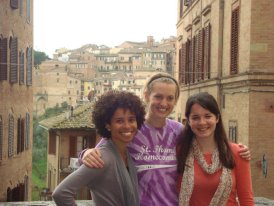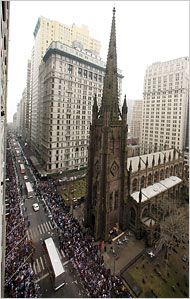Written by Maureen Harrington ’14, Catholic Studies and English
It has been about two months since the fall 2012 Bernardi clan first congregated in the Eternal City, and I can say with confidence that the Spirit is moving! Over the last six weeks we have had an abundance of opportunities to see the Church as the Body of Christ in a very tangible way, not only through the sacred art and history of Rome, but through the literal thousands of pilgrims, clergy, and religious we encounter daily.
Another good thing about living in Rome, and even Europe in general, is that one is afforded many opportunities to visit the tombs, birthplaces, schools, and relics of almost any saint, blessed, venerable, Servant of God, or random holy person who will probably be canonized at some point. Neither of my closest patrons, St. Thomas Aquinas and St. Teresa of Avila, are buried here in Italy, but I’ve still been amazed at how present they’ve been since I left the US back in September. I am blessed not only to take classes at yet another university named after my favorite socially awkward, phlegmatic philosopher, but to have two of his fellow Dominicans as professors. One of them, Fr. Paul Murray (who was Mother Teresa’s spiritual director, no big deal) quotes Teresa of Avila at least twice per class, which increases his awesome factor by about one thousand percent, if that is possible.
Speaking of that fabulously sassy Carmelite sister, in addition to her frequent appearances in my Spiritual Theology notes, Teresa of Avila has had a particular presence in my attempts to enter into the Year of Faith here in Rome. Pope Benedict XVI’s homily to open the Year of Faith hearkened back to Paul VI’s 1975 apostolic exhortation Evangeli Nuntiandi, in which he stressed the importance of reinvigorating the Church from the inside out. As recent events in our country have made clear, complacent evangelization in this day and age will not be enough to sustain religious freedom, let alone spread the gospel. This makes the task of effective witnessing all the more important for us as Catholics. A few weeks ago, I was reading Teresa’s Interior Castle when the Lord allowed me to stumble upon this gem:
Let it cost her what it may and as dear as she desires, for she longs to lose a thousand lives to lead one soul to praise Thee but a little better. If as many lives were hers to give, she would count them well spent in such a cause, knowing as a truth most certain that she is unworthy to bear the lightest cross, much less to die for Thee. (6.3)
On the “how humbling is this?” scale of 1 to 10, I would say that this was an 11, except that it actually probably didn’t humble me enough because I’m so dang prideful and Teresa is so dang holy. Over the years since I’ve truly started to live my faith, I don’t think I’ve once stopped to ponder the fact that any suffering I undergo for the gospel is not a gift simply because I can offer it up, but because I am completely unworthy to do so. I’m not even talking about real suffering; I’m talking putting on a retreat when I’m tired or waking up for morning prayer after a late night of homework. I am blessed to suffer even the tiniest discomforts for the kingdom only because He is humble enough to work through weak and corrupt human beings.
Teresa’s pep-talk came at a providentially opportune moment for me, because there’s nothing like being plopped in a foreign country and surrounded by people who are much holier than you to affirm that you are not God’s gift to the new evangelization. As full of blessings and consolations as this semester has been, there are definitely trials that come along with being uprooted. For one thing, I don’t really speak much Italian, and most of the words I do know have to do with food. Being so limited in how I can relate to people outside of our community vocally makes imperfections in how I act and present myself glaringly apparent. Just when I start to tell myself that I’m a patient person, I get lost on my way to class and have to ask for directions from someone who can’t understand a word of my Minnesota-accented Italian, and then they tell me the wrong way because they’re confused and I end up missing 45 minutes of Modern Philosophy… hypothetically, of course. On top of the language barrier is the fact that, as difficult as asking for help or directions is, I have to do it a lot. I’m just starting to get used to things like ordering food and buying train tickets, so I’ve had more of these humbling interactions than I can begin to count.
As uncomfortable as these experiences can be, they’ve forced me to focus on reflecting Christ to people in little ways, like answering with a smile when somebody gets annoyed that I can’t understand what they’re telling me in Italian. As Mother Teresa so aptly says, “We can do no great things- only small things with great love.” This truth has never been clearer to me than now. Sometimes I can’t even remember how to tell someone to have a nice day, let alone tell them about the Lord. All I have is Christ, and the ability to let him love through me. Living in Bernardi is such a gift, because I’m surrounded by people who are striving to live their Catholic faith as well, and definitely call me on to holiness. This sometimes puts my life into rather harsh perspective, but it has allowed me to grow in areas that I didn’t even recognize previously. There’s nothing more humbling or beautiful than interacting with people who allow themselves to be filled with Christ, and I’m blessed to do this constantly.
In one of our first meetings back at St. Thomas last semester, I remember being told that the Rome experience was sometimes difficult in the midst of it. Although I will say that it has overall been a wonderfully peaceful and joyful time for me, it is also certainly challenging for all of the reasons that I described. However, being so removed from distractions, living under the same roof as the Eucharist, and being physically surrounded by the saints, martyrs, and a faith-filled community, these difficulties have born much more fruit than I’ve ever allowed them to before. For each trial that I’ve had (and really, they’re small trials), I’ve been better able realize that any tiny good I do is only possible by the grace of God. Only when I’m really humble will I be able to be a light to anyone, and then only because He allows me to be.

